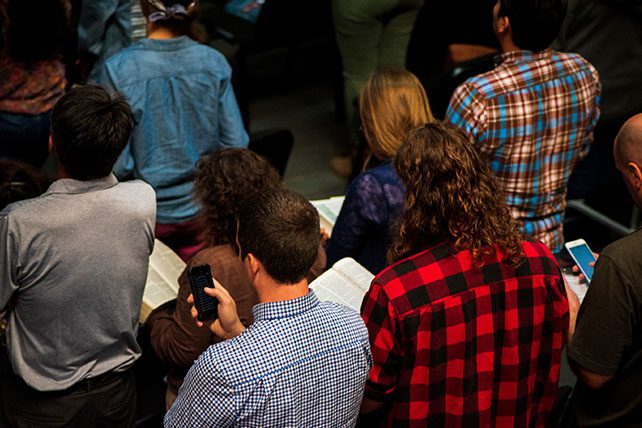A church lighting philosophy of focusing all the lighting up front can subtly communicate that the most significant activity of the meeting is taking place there. But we’re gathering as the church, not going to a concert. We’re a body, a temple, a house. The most important sound of the gathering is the congregation, not the musicians. A lit auditorium can help reinforce that theological principle (see Ps. 34:3; Ps. 150; Col. 3:16; Rev. 7:9-10).
2. House lights enable a leader to see the congregation.
More than once, I’ve been in a situation where I can’t see who I’m leading. If I catch it in rehearsal, I ask the tech people to turn up the house lights. I want to be able to see how people are responding and whether they’re engaged. That’s harder when I can’t see them.
RELATED: Church Light on a Budget
I can hear someone saying, “But you don’t know my church. I’m trying to avoid looking at their unenthusiastic, bored, disengaged, discouraging faces!” True. It can be less than inspiring to the people you’re leading. But it’s better to know how they’re being affected than to close my eyes and ignore them all together.
3. We don’t want people to be ashamed.
When the church gathers to strengthen one another, we should do whatever we can to encourage boldness and engagement. Here’s David describing his attitude toward others listening in on his praise:
My heart is steadfast, O God! I will sing and make melody with all my being!
Awake, O harp and lyre! I will awake the dawn!
I will give thanks to you, O LORD, among the peoples; I will sing praises to you among the nations. (Ps. 108:1-3)
He put a new song in my mouth, a song of praise to our God.
Many will see and fear, and put their trust in the LORD. (Ps. 40:3)
If he had a church lighting philosophy, David would want everyone around him to see and hear him praise God, who is worthy of our strongest affections. Why wouldn’t we want to encourage our people to have the same perspective? A dark room can lead people to progress from thinking their role isn’t that important to complete disengagement.
4. We want to make it possible for people to see their Bibles.
A dark room makes referencing a physical Bible during that time difficult, if not impossible. At times, we turn lights down when we sing and turn them up for the preaching. Do we never want people to look at their Bibles when we sing? Or write down a thought they received during a song?
Of course, nothing I’ve said here forbids a candlelight service. And you can keep singing when the power goes out. And as I mentioned earlier, there are legitimate reasons to adjust the house lighting when we worship God in song. But God doesn’t put people next to me in the gathering so I can ignore them. We sing together to deepen the relationships we enjoy through the gospel.
So next time your church meets, try leaving the lights on or at least turning them up. It may be a little awkward at first. But if you take time to explain biblically what you’re doing, you might be surprised how people in your congregation start to realize the crucial role they play on Sunday mornings.
What makes congregational worship amazing is not the church lighting philosophy or the architecture or the aesthetics. We’re in an ordinary room doing something extraordinary. We are God’s people joyfully and expectantly engaging together with the Creator of the universe and the Redeemer of our lives in the power of his Spirit.
And that’s something worth shedding some light on.
And night will be no more.
They will need no light of lamp or sun,
for the Lord God will be their light,
and they will reign forever and ever. (Rev. 22:5 ESV)


